
Little Fugitive is a 1953 American independent drama film co-written and co-directed by Raymond Abrashkin, Morris Engel, and Ruth Orkin, which tells the story of a child alone on Coney Island. It stars Richie Andrusco as the title character, and Richard Brewster as his older brother. The film was screened at 14th Venice International Film Festival, where it was awarded the Silver Lion, and nominated for Best Writing, Motion Picture Story, at the 26th Academy Awards.

John Nicholas Cassavetes was a Greek-American filmmaker and actor. He began as an actor in film and television before helping to pioneer modern American independent cinema as a writer and director, often producing and distributing his films with his own money. He received nominations for three Academy Awards, two BAFTA Awards, four Golden Globe Awards, and an Emmy Award.

Faces is a 1968 American drama film written, produced, and directed by John Cassavetes. It is his fourth directorial work. The film, shot in cinéma vérité-style, depicts the final stages of the disintegrating marriage of a middle-aged couple, played by John Marley and newcomer Lynn Carlin. Cassavetes regulars Gena Rowlands, Seymour Cassel, Fred Draper and Val Avery also star.

Turner Classic Movies (TCM) is an American movie-oriented pay-TV network owned by Warner Bros. Discovery. Launched in 1994, Turner Classic Movies is headquartered at Turner's Techwood broadcasting campus in the Midtown business district of Atlanta, Georgia.

Zero Hour! is a 1957 American drama film directed by Hall Bartlett from a screenplay by Bartlett, Arthur Hailey, and John Champion. It stars Dana Andrews, Linda Darnell, and Sterling Hayden and features Peggy King, Elroy "Crazy Legs" Hirsch, Geoffrey Toone, and Jerry Paris in supporting roles. It was released by Paramount Pictures.

Boxcar Bertha is a 1972 American romantic crime drama film directed by Martin Scorsese and produced by Roger Corman, from a screenplay by Joyce H. Corrington and John William Corrington. Made on a low budget, the film is a loose adaptation of Sister of the Road, a pseudo-autobiographical account of the fictional character Bertha Thompson. It was Scorsese's second feature film.
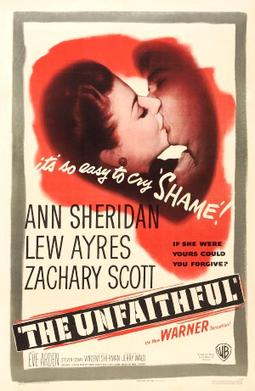
The Unfaithful is a 1947 American murder mystery film noir directed by Vincent Sherman and starring Ann Sheridan, Lew Ayres and Zachary Scott. It was produced and distributed by Warner Brothers. Regarded by some as a film noir, the picture is based on the W. Somerset Maugham-penned 1927 play and William Wyler-directed 1940 film The Letter, which was reworked and turned into an original screenplay by writers David Goodis and James Gunn who shifted the setting from Malaya to the United States.
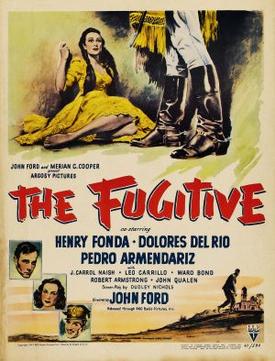
The Fugitive is a 1947 American drama film starring Henry Fonda and directed by John Ford, based on the 1940 novel The Power and the Glory by Graham Greene. The film was shot on location in Mexico.
Ruth Orkin was an American photographer, photojournalist, and filmmaker, with ties to New York City and Hollywood. Best known for her photograph An American Girl in Italy (1951), she photographed many celebrities and personalities including Lauren Bacall, Doris Day, Ava Gardner, Tennessee Williams, Marlon Brando, and Alfred Hitchcock.

Rafter Romance is an American 1933 pre-Code romantic comedy film directed by William A. Seiter and released by RKO Radio Pictures. The film, which was based on the 1932 novel of the same name by John Wells, stars Ginger Rogers, Norman Foster and George Sidney, and features Robert Benchley, Laura Hope Crews and Guinn Williams.

One Way Passage is a 1932 American pre-Code romantic film starring William Powell and Kay Francis as star-crossed lovers, directed by Tay Garnett and released by Warner Bros. The screenplay by Wilson Mizner and Joseph Jackson is based on a story by Robert Lord, who won the Academy Award for Best Story.

Ex-Lady is a 1933 American pre-Code comedy/drama film directed by Robert Florey. The screenplay by David Boehm is a remake of the Barbara Stanwyck film Illicit (1931), both crediting a story by Edith Fitzgerald and Robert Riskin. The film focuses on a pair of lovers, commercial illustrator Helen Bauer and advertising writer Don Peterson, who have been living together quite happily for some time. One night, after hiding in Helen's bedroom until their party guests have all left, Don announces that he is tired of sneaking around. He wants marriage—and possibly children—and Helen finally agrees, although she is afraid that it will wreck their relationship. Her predictions of trouble—increased by the stresses of opening their own advertising agency—come true, but in the end, with the serendipitous intervention of their perpetually inebriated friend, Van, they reconcile and resume the mixed blessings of wedded bliss.
Morris Engel was an American photographer, cinematographer and filmmaker best known for making the first good-quality, internationally-recognized American film "independent" of Hollywood studios, Little Fugitive (1953), in collaboration with his wife, photographer Ruth Orkin, and their friend, writer Raymond Abrashkin.

The Buster Keaton Story is a 1957 American biographical drama film directed by Sidney Sheldon and written by Sidney Sheldon and Robert Smith, following the life of Buster Keaton. The film stars Donald O'Connor, Ann Blyth, Rhonda Fleming, Peter Lorre, Larry Keating and Jackie Coogan. It was released on April 21, 1957, by Paramount Pictures. The film was described by AllMovie as "sublimely inaccurate" regarding details of Keaton's life. It was produced by Paramount Pictures, which paid Keaton $50,000 for the rights to his life story.

Living on Love is a 1937 American romantic comedy film released by RKO Radio Pictures. Directed by Lew Landers, it stars James Dunn, Whitney Bourne, and Joan Woodbury. The film is a remake of the RKO film Rafter Romance (1933). It is one of the "lost RKO films" owned by Merian C. Cooper and only re-released in April 2007 when Turner Classic Movies acquired the rights and aired all six films on its channel.
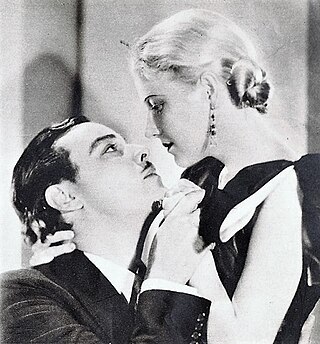
The Right to Romance is a 1933 American pre-Code drama film starring Ann Harding and Robert Young and released by RKO Radio Pictures.
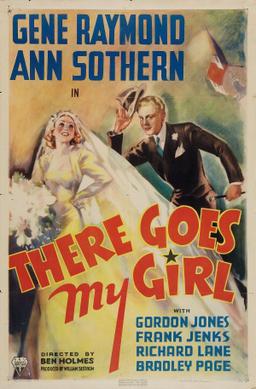
There Goes My Girl is a 1937 American comedy film directed by Ben Holmes, written by Harry Segall, and starring Gene Raymond, Ann Sothern, Gordon Jones, Richard Lane, Frank Jenks and Bradley Page. It was released on May 21, 1937, by RKO Pictures.

Scattergood Meets Broadway is a 1941 American comedy film directed by Christy Cabanne and written by Michael L. Simmons and Ethel B. Stone. It is the sequel to the 1941 film Scattergood Pulls the Strings. The film stars Guy Kibbee, Mildred Coles, William "Bill" Henry, Emma Dunn, Frank Jenks, Joyce Compton and Bradley Page. The film was released on August 22, 1941, by RKO Pictures.
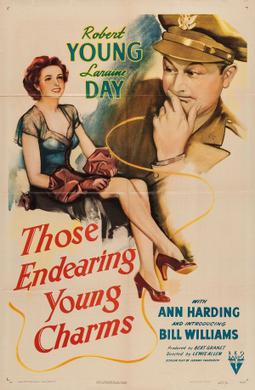
Those Endearing Young Charms is a 1945 American comedy film directed by Lewis Allen and written by Edward Chodorov from his play of the same name and starring Robert Young, Laraine Day, Ann Harding, Bill Williams and Marc Cramer.
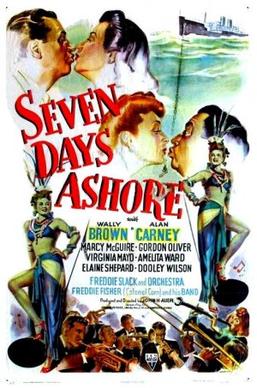
Seven Days Ashore is a 1944 American comedy film directed by John H. Auer and written by Edward Verdier, Irving Phillips and Lawrence Kimble. The film stars Wally Brown, Alan Carney, Marcy McGuire, Virginia Mayo, Elaine Shepard, Gordon Oliver, Amelita Ward and Dooley Wilson. The film was released on April 25, 1944, by RKO Pictures.



















